Almost There: Juliette Binoche in "Three Colors: Blue"
 Wednesday, January 13, 2021 at 9:33PM
Wednesday, January 13, 2021 at 9:33PM 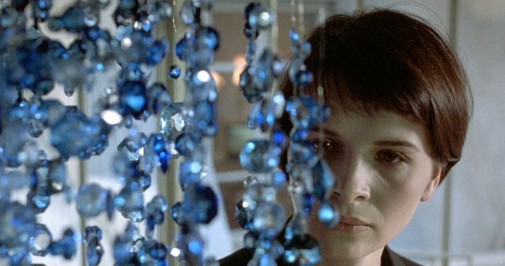
With Pieces of a Woman having premiered on Netflix, Vanessa Kirby becomes one of the big contenders in this year's Best Actress race. She previously won the Volpi Cup, joining a selection of other actresses who managed to turn a win at Venice into genuine Oscar buzz. However, not every Volpi champion is as lucky as to get a nomination. In 1993, Juliette Binoche managed to earn the Cup for her studies of loss in the first part of Krzysztof Kieslowski's trilogy about Europe and the French Revolutionary ideals. Still, when Oscar nomination morning arrived, Binoche's searing work in Three Colors: Blue was not found amid AMPAS' choices…
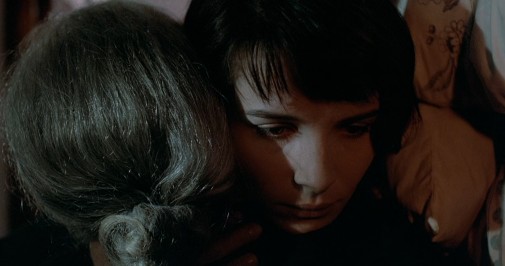
Grief is a complicated unseemly animal. To capture its true form is a challenge many artists have tried and almost as many have failed. The beast runs and hides, its body as unsolid as smoke, slipping through our fingers the very moment one starts to get a grasp. It's aided, in this perpetual evasion, by cultural and societal expectations of what grief should look like. Facing loss, to not cry can be as criminal as crying too much. Being acerbic is understandable, but only up to a point. Being listless and numb is a privilege we only give some people. The parameters are strict, inhuman, and as byzantine as any convention.
If we peruse film history, we can easily see many of those expectations in action. Notice the pressure for grief to be beautiful, a martyr's teary-eyed reaction to loss, limpidly emotional but not to the point it might become ever so slightly repugnant. When the saintly sorrow isn't the chosen path, there's always the opposed approach. It manifests in many stories about violent people, grief shedding propriety, assuming a new form that surpasses common hideousness to become more monstrous, more openly violent.
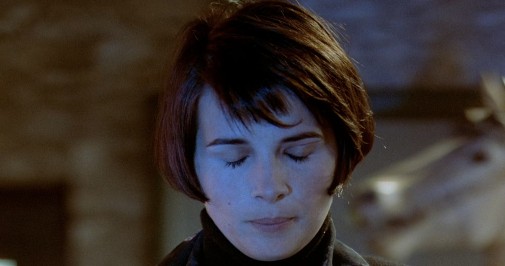
A tinkling simper or a bloodthirsty roar, a pretty implosion or a terrible explosion, these are the main modes in which mainstream cinema tends to portray the ever-changing face of grief. However, in both extremes, one hears untruth, a whisper of falsity, a song of manipulation. I don't mean to shame the common binaries of dramatized grief. Great works of art have blossomed from its fertile grounds, but one can't help but want more. The sad truth about this human reality is that it's often a mess, a complex web of contradictions that's ugly in unspectacular fashion, neither glamorous nor demonic.
It festers in the soul. It can freeze it cold, take it to boil, infect and sometimes even heal. Grief's a hydra-like beast. Cut off one head, and two more will spring forth, ready to bite you, kiss you, taste you, throw up on you. Perhaps because none of us wants to feel it though we're all condemned to do so, there's a collective effort to avoid its actuality and lose ourselves amidst vacuous idealizations. Whatever the reason, all this gibberish concludes that honest representations of grief are rare and to materialize them takes both a lot of craft, discipline, and courage, a willingness to repel, to shock, to scandalize, and confuse.
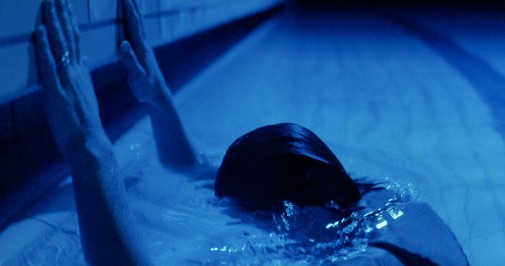
The glorious pair of Binoche and Kieslowski has all those qualities in spades, and their Blue is perhaps my favorite representation of grief ever put to film. What's more interesting is that, putatively, this isn't even an exploration of loss, but a celebration of liberty, of freedom. Only those things manifest themselves by way of tragedy, making us question the essential value of being free if the path to such deliverance is full of blood, small coffins, and mournful requiems. It all begins with a bang, a car crashing into a tree, smoke erupting from the wreck as a kid's ball bounces away. Death is the starting point.
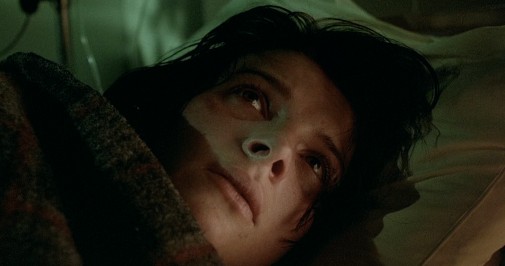
Julie is the wife of a famous composer, and we meet her on a hospital bed, as she discovers she's the sole survivor of the accident that claimed the lives of her husband and little daughter. She despairs, though Kieslowski doesn't let us spend too much time in the instant of shock. Immediately after, Julie tries to commit suicide but is too scared to die, what remains of a survival instinct's keeping her tethered to life even as her heart may long for annihilation. Nonetheless, it's through destruction that she finds a new way of confronting her earthly existence. More specifically, she kills her old life by getting rid of its material signifiers, property and objects. All of it except a blue chandelier, the color she most associates with her family's fate.
Whatever wisps of plot exist in the film concern the composition of a hymn for the unification of Europe, a musical celebration of the fall of the Soviet Union and the start of a new era for the Old World. The piece was to be written by the dead man but is instead brought to life by our protagonist. Like Julie, the Europe of Blue faces a rebirth forged in the fires of bereavement. However, one shouldn't reduce the character or her film to symbolic puzzles. Julie finds her freedom in tandem with the continent, it's true. Nonetheless, hers is a personal story that's always played at the scale of people, not ideas.
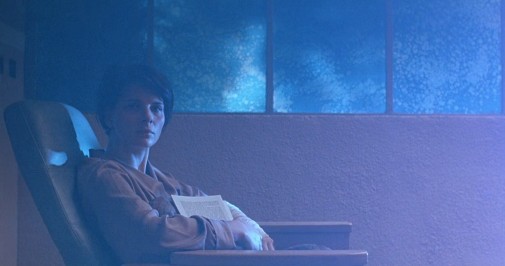
In some ways, Blue's a blunt film, one that announces its intentions in brusque directness while simultaneously allowing them to breathe. It's in those breaths that the spiritual power of the picture resides, that the actors' performances achieve greatness. Binoche is interpreting someone trying to build herself up from absolute despondence and doing so through negative actions. Not only is she getting rid of her old life, but she's also trying to erase her emotions. Some actors would perform the hell out of such bottled-up pain, but Binoche chooses to project this state of being by following along with her character. Like Julie, she attempts to erase any affectation, any inkling of personhood.
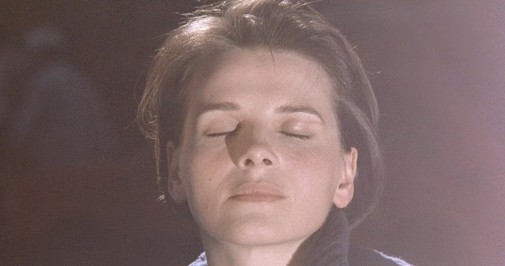
It looks, superficially, as an act of uncaring mourning, a performance of blank stares and little else. Try to look deeper. Investigate the pauses when Julie is looking into the azure shine of the chandelier, the instances she thinks nobody's watching. Then you'll see the crack in the façade, the effort by which this blank canvas avoids being painted on. Binoche isn't here to explain to us who Julie is or what she's going through. The actress is here to show the character living in the universe of the film. It's up to us if we want to make the effort to meet her where she's at or not. It's a prickly thing, uncomfortable to observe and singularly detached, a vision of grief as something that's intrinsically unknowable to those that stand outside of it.
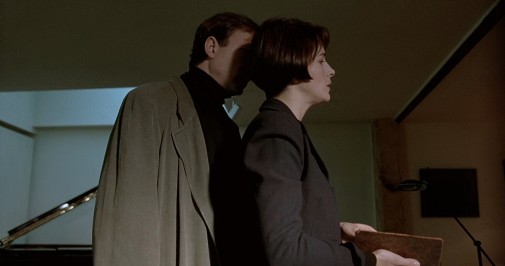
Such insular feats of acting are hard to create and painful to appreciate. At a certain point, when staring into the void, the void stares back, and its eyes are our own. To get Julie is to see in her the reflection of our complicated humanity, the ugliness we carry inside, the sharpness, the despair. Re-watching Blue in the aftermath of my recent dealings with loss, I was keenly aware of the anger that lives inside Binoche's Julie. If you let her be alone for too long, you'll catch a glimpse of inchoate fury, a sudden self-mortification, the belligerent tension of a composer who wants to be deaf but keeps hearing the ghost of a future symphony. The anger of a woman who wants to feel nothing but keeps feeling.
Critics have described Blue as an anti-tragedy in the same way that White is an anti-comedy and Red an anti-romance. While I'm not too fond of this strict description of the trilogy, Blue and Binoche's Julie certainly feel as if they're deliberately trying to drain the tragedy out of a tragic premise. Out of death comes a new life, a new beginning born from an end. As Julie ends the film rejoining the world of the living, of the feeling, she has scraped herself clean in the purification waters of sorrow and came out necessarily changed. There's hope that those changes are for the better. The bloom of generosity to a hated adulterer suggests that, at the very least. Still, even when Julie's story nears a conclusion, Binoche chooses ambivalence. Grief is a mystery to the last second of Blue, and its leading lady valiantly keeps it that way.
Oscar-wise, Juliette Binoche did get further than many might suppose considering the arthouse nature of Kieslowski's odd hymn to liberty. The movie itself was nominated for three Golden Globes, including Best Actress in a Drama. In contrast, eventual Oscar nominee Debra Winger was ignored by the HFPA for her work in Shadowlands. Along with Winger, the rest of AMPAS' selected five were Angela Bassett in What's Love Got to Do with It, Stockard Channing in Six Degrees of Separation, Emma Thompson in The Remains of the Day, and the victorious Holly Hunter in The Piano.
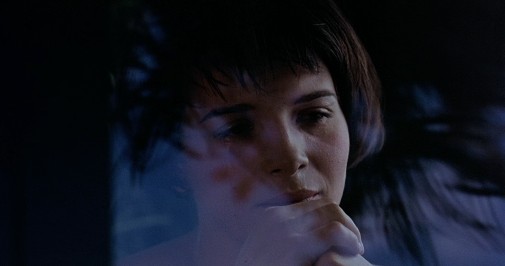
Kieslowski's Three Colors trilogy is available to stream on the Criterion Channel and HBO Max.



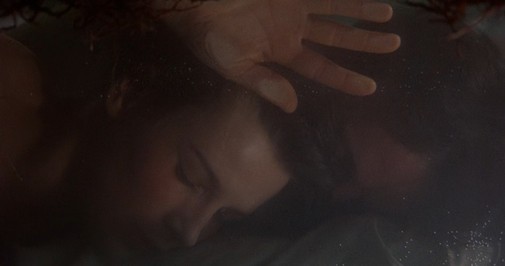
Reader Comments (22)
I think 93 is one of the best in the category,shame on me but i've never seen Binoche in this but do wish Pfeiffer or Foster had taken Winger's spot.
Man, that was a performance that KILLED me. Made me cry my fucking eyes out.
Binoche is superb in Blue, I cried the first time I watched it, and everytime I lose somebody I remember her face.
1993 was a great year for actresses, my top 8:
1.Holly Hunter
2.Juliette Binoche
3.Tilda Swinton
4.Angela Bassett
5.Emma Thompson
6.Stockard Chaning
7.Michelle Pfeiffer
8.Debra Winger
Also the music in Blue is great, as well the cinematography and editing.
A great performance about grief was Casey Affleck from Manchester.... Very powerful and haunting, very quietly too for the most part.
Stellar performance by Binoche, way better than the two she received Oscar attention for. I'm so thrilled she was picked Kieślowski's movie over "Jurassic Park".
*has received
That year is one of my all time favourite best actress line ups.
Hunter/Thompson/Bassett are about as good as it gets in any year.
Channing and Winger were deserving for sure, but Pfieffer should have been in there, then either Binoche or Gong Li.
How Pfeiffer missed that year I'll never know.
And this is my all time fave Binoche performance along with Certified Copy. She works so much, and never phones it in. I hope one day she'll be back in the race. It's a shame The Truth kind of disappeared last year, it was great.
Can I add Jodie Foster for Sommersby and Hiep Ti Lei for Heaven and Eath and Meg Ryan for Sleepless in Seattle which I think nearly happened,
Angela Bassett, What's Love Got to Do with It?
Juliette Binoche, Three Colors: Blue
Holly Hunter, The Piano
Michelle Pfeiffer, The Age of Innocence
Emma Thompson, The Remains of the Day
thevoid99: Get yourself together please.
One of the five best performances I've ever seen
When she eats the blue lollipop, I realized she wasn’t just a terrific actress, but one of the few who could capture unspoken emotional states and make them completely believable for the audience. It doesn’t hurt she’s one of the all-time great criers.
Also my favorite of the films in the Colors trilogy, thanks to the cafe scene. My god I’ve rarely been so hypnotized by an espresso and ice cream. Sublime.
All 5 deserved their nominations. My vote would've been for Winger, who is magical, and it would have been for her even if Binoche had been deservedly nominated.
This is an undeniable performance, Binoche's absolute best, maybe. My 1993 top 5:
Pfeiffer - The Age of Innocence
Hunter - The Piano
Thompson - The Remains of the Day
Binoche - Blue
Channing - Six Degrees of Separation
It's a shame both Binoche and Pfeiffer weren't recognized. Bassett and Winger were good but not in the league of Juliette and Michelle.
She (and that film) are sublime. My only "but" to "Three colours: Blue" is that the screen time of Emmanuelle Riva in it is too short...
Coincidentally, I watched "Celle que vous croyez" last night and, apart from confirming once more that Binoche is wonderful, I was amazed about how much she and Julia Roberts look alike sometimes, taking into account that they are so different as actresses (but both great in their own way!)
it's really difficult to choose between Holly Hunter and Juliette Binoche, in 1993, it's really a toss up. Sigh.
How in the world, by the way, were snubbed BOTH scores? Both The Piano and Blue are easily giving a run for its money to both John Williams' masterful 93 scores for Spielberg... and probably topping any other competitor...
Oh, was it an awesome year! And 94 was as good or even better.
What order should I watch the Three Colors Trilogy? I have always wondered.
Should it be in the order of release?
- Blue
- White
- Red
Or is there a better order to watch them?
"...I was amazed about how much she and Julia Roberts look alike sometimes, taking into account that they are so different as actresses (but both great in their own way!)" - bonobo
the resemblance strikes me every time.
Mike - it doesn't matter if you which order you watch Blue or White, but you should definitely watch Red last.
markgordonuk -- I just now realized that I wrote two Almost There pieces in a row advocating against Debra Winger nominations. I swear I like her, but she did get in some nominations that kept worthier work from being recognized. In contrast, I think she's been doing great work in the 21st century and continuously being ignored by most awards voters.
thevoid99 -- This entire film kills me. It's one of my favorites.
Cafg -- I'd have nominated BLUE for a bunch of Oscars, including those elements you describe. The cinematography and score are especially divine.
TheDrMystery -- I like to pretend her nomination for CHOCOLAT never happened.
JWB -- This and CERTIFIED COPY are my two favorite Binoche performances too.
Tyler -- A great lineup, though I'd probably put Tilda Swinton for ORLANDO instead of Pfeiffer. I also prefer Thompson in MUCH ADO ABOUT NOTHING. 1993 was such a rich year.
bonobo -- Riva's screentime is minuscule but I do think she's quietly great in the film. That mother-daughter relationship is only hinted at but it feels laceratingly real.
Jesus Alonso -- I'll never understand the Academy's music branch. How can they nominate THE PIANO for so many honors and then snub its score. Campion's masterpiece and BLUE are two of my favorite films of all-time so I'm biased, but the snubs still hurt.
Mike -- I think the order of release is the best way to experience it.
Thank you all for the feedback.
Was thoroughly thunderstruck by this performance when I first watched it. One of my all-time favorites for sure.
After really trying these study methods, I saw that it was the most effective and creative way to study law as a whole subject, which helped me to significantly improve my knowledge.